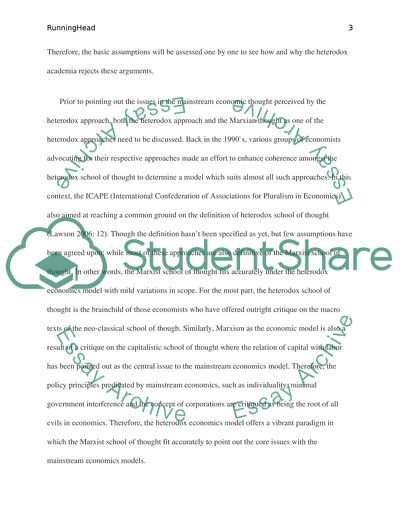Cite this document
(Heterodox Economics Essay Example | Topics and Well Written Essays - 2250 words, n.d.)
Heterodox Economics Essay Example | Topics and Well Written Essays - 2250 words. https://studentshare.org/macro-microeconomics/1854817-using-a-heterodox-economics-approach-of-your-choice-diagnose-what-you-consider-to-be-a-central-problem-with-mainstream-economics-and-discuss-how-well-your-chosen-approach-addresses-this-problem
Heterodox Economics Essay Example | Topics and Well Written Essays - 2250 words. https://studentshare.org/macro-microeconomics/1854817-using-a-heterodox-economics-approach-of-your-choice-diagnose-what-you-consider-to-be-a-central-problem-with-mainstream-economics-and-discuss-how-well-your-chosen-approach-addresses-this-problem
(Heterodox Economics Essay Example | Topics and Well Written Essays - 2250 Words)
Heterodox Economics Essay Example | Topics and Well Written Essays - 2250 Words. https://studentshare.org/macro-microeconomics/1854817-using-a-heterodox-economics-approach-of-your-choice-diagnose-what-you-consider-to-be-a-central-problem-with-mainstream-economics-and-discuss-how-well-your-chosen-approach-addresses-this-problem.
Heterodox Economics Essay Example | Topics and Well Written Essays - 2250 Words. https://studentshare.org/macro-microeconomics/1854817-using-a-heterodox-economics-approach-of-your-choice-diagnose-what-you-consider-to-be-a-central-problem-with-mainstream-economics-and-discuss-how-well-your-chosen-approach-addresses-this-problem.
“Heterodox Economics Essay Example | Topics and Well Written Essays - 2250 Words”. https://studentshare.org/macro-microeconomics/1854817-using-a-heterodox-economics-approach-of-your-choice-diagnose-what-you-consider-to-be-a-central-problem-with-mainstream-economics-and-discuss-how-well-your-chosen-approach-addresses-this-problem.


